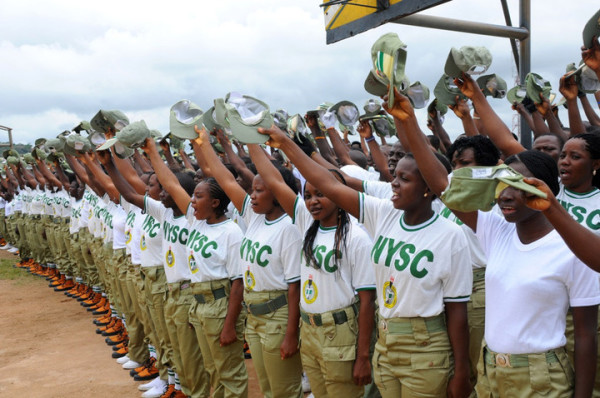 A week ago, before the elections was postponed from the 16th to the 23rd of February, Nigerian youths, most of them corps members, slept in the cold. Outside the Independent National Electoral Commission (INEC) secretariats in all 36 states and their Registration Area Centres (RACs), corps members waited for directives from the INEC officials on how to handle the elections. Photos of corps members in dire conditions—sleeping on the bare ground, on lawns, on makeshift cardboard beds, on posters—flooded the Nigerian cyber space.
A week ago, before the elections was postponed from the 16th to the 23rd of February, Nigerian youths, most of them corps members, slept in the cold. Outside the Independent National Electoral Commission (INEC) secretariats in all 36 states and their Registration Area Centres (RACs), corps members waited for directives from the INEC officials on how to handle the elections. Photos of corps members in dire conditions—sleeping on the bare ground, on lawns, on makeshift cardboard beds, on posters—flooded the Nigerian cyber space.
By 3 AM that morning, word had spread that INEC had postponed the elections. Alas, the nightmare that the corps members had experienced all night was all in vain.
With heavy feet, Nigerian youths returned home (many to their “corpers’ lodge”). The INEC officials didn’t address the youths who had slept outside and been feasted on by mosquitoes.
“At 2 AM we saw on social media that the elections had been postponed. Before we knew it, they (INEC officials) put off the generators and began to pack up without saying a word to us,” said Taiwo Awolesi, a corps member serving in Lagos. They were left in the dead of the night far away from home, and for some, in a community they had never been to or heard of, all without any security. “The security personnel that accompanied them went along with them,” Awolesi said. The corps members were stranded. In the far south in Cross-River State, another corps member, Joseph Adeiye said the night was simply “horrible.”
Since the episode, INEC is yet to issue a statement to NYSC and, particularly, corps members on the issue, or give them some form of compensation for their troubles.
“I didn’t find the situation comfortable. I sat all through the night,” said Arinola Kolade, another corps member serving in Lagos. At Kolade’s RAC, after corps members learned of the postponement via social media, the ad-hoc staff were sent out of the RAC, a public primary school, without any statement or formal apology to them from their supervisors. “We were asked to leave the RAC. We didn’t have enough security,” she told me.
One would imagine that with the series of laments and complaints by the youths—who had been made to sleep outside on makeshift beds—in the media, INEC would do better and restructure their blueprint to include the welfare of the corps members. Instead, they chose the high road. “I honestly didn’t think INEC did anything different,” Kolade said.
INEC had earlier postponed the elections based on inconclusive logistics. “Following a careful review of the implementation of its logistics and operational plan, the commission came to the conclusion that proceeding with the elections as scheduled is no longer feasible,” INEC said in its press release. Despite this postponement, the commission still failed to put its house in order by the 23rd. “The issues were not addressed. Same thing happened again. Some materials were not available, no adequate buses to convey ad-hoc staff to their polling units, I didn’t have a cubicle, problems everywhere” Kolade lamented.
Ms Taiwo was also unwavering in insisting on INEC’s inability to meet up with expectation. “They just provided a few mats, which were even shared at 5 AM, after many of us had slept on the bare floor,” she said. INEC’s logistics, despite postponing the elections,were a “failure,” Chisom Chukwu, another corps member serving in Bayelsa, said. “They were not ready for the elections. They failed in covering up their deficiencies.” He added that they (ad-hoc staff) where blamed for INEC’s failure. Speaking on the thugs in his polling unit who came to disrupt the flow of the elections, he said they were almost physically assaulted. “The blamed us for starting the elections late, for them not casting their votes on time. They said they would hold us hostage and we were going nowhere.”
The security with the corps members was far from being tight. The officers barely defended the corps members from the attacks by thugs who sought to disrupt the process. Endless stories of ballot boxes being burnt were heard. In some cases bullets were let loose in the air, the streets deserted. “We didn’t have security with us while going to out polling units,” Kolade said. “We went to our polling units led by party agents. I was scared.” she added.
In some polling units the security personnel met the corps members at their polling stations. Many of them had no weapon on them. “He didn’t have anything. If anything had happened to us he would have run,” Kolade said about the security agents at her polling unit.
Ms Taiwo said on the issue of the safety of corps members that “I was given just one security operative who was not even armed.”
“The presence of security operatives made no difference,” said Adeiye on the matter.
I asked the corps members if they would partake as ad-hoc staff in the coming gubernatorial elections scheduled for the 9th of March and they all emphatically said they wouldn’t, saying they had had enough of INEC’s conduct.
“I am very disappointed with INEC for their lack of organization and hospitality,” Awolesi said. “The electoral process is massively flawed.”
The post Dennis Da-ala Mirilla: INEC’s Treatment of Corp Members Might Just Cost Them a Chunk of Ad-Hoc Staff appeared first on BellaNaija - Showcasing Africa to the world. Read today!.



0 Comments:
Post a Comment